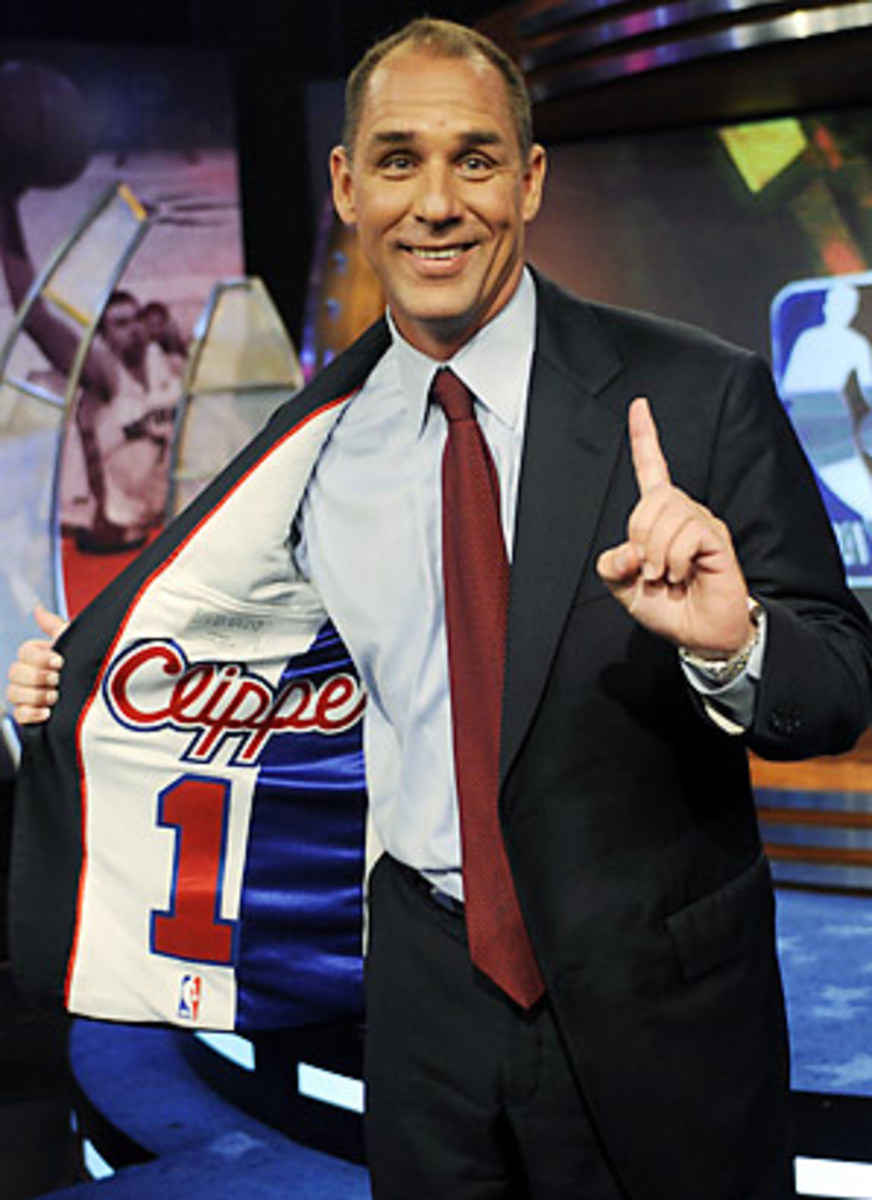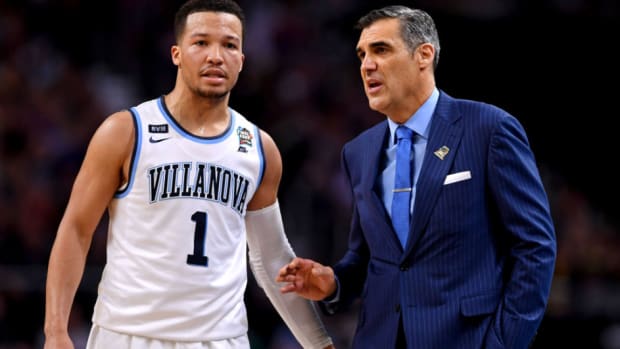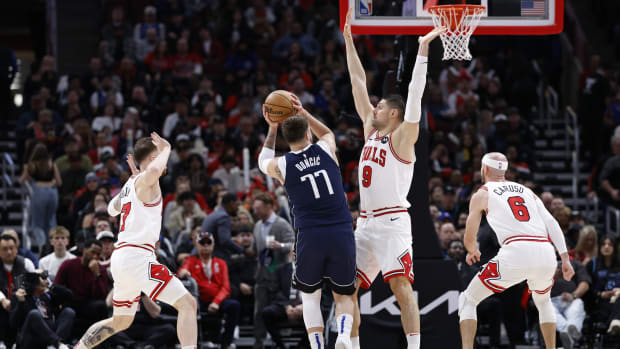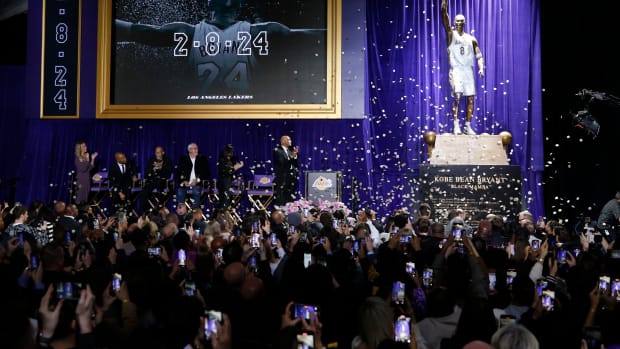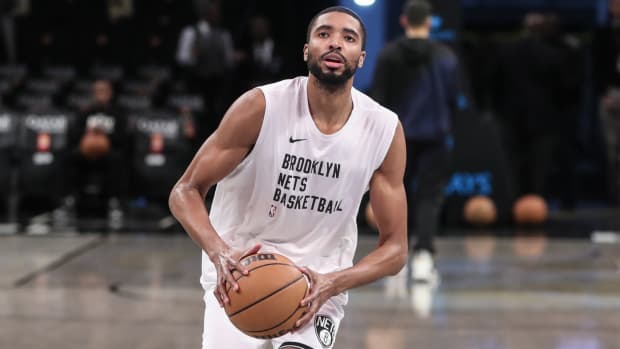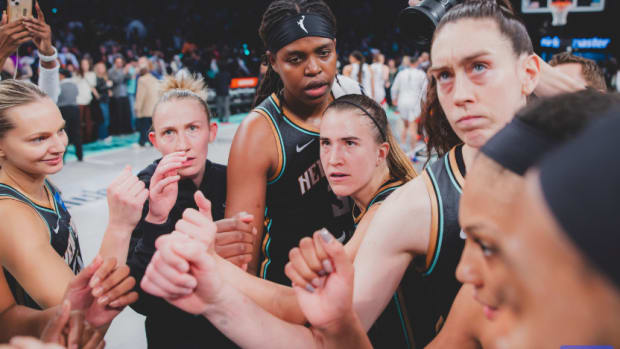Roundtable: Lottery winners, losers
SI.com NBA writers analyze the latest news and address hot topics from around the league.
1. Who were the biggest winners and losers in Tuesday's draft lottery?
Ian Thomsen: The losers obviously were the Kings and Wizards, the Nos. 1 and 2 worst teams in the league who fell to Nos. 4 and 5 in the draft, respectively. Let's see how the Wizards do in a trade for their pick and whether it helps launch them back into contention next year -- in which case they'll survive the bad luck.
Of course, the Clippers were the big winner. But the team that is going to benefit most will be Memphis by taking Ricky Rubio with the No. 2 pick. He is going to give that franchise an exciting identity in the open floor. He's a terrific passer who will make the Grizzlies worth watching.
Jack McCallum: If I were a mean, cynical person, I'd say the big loser was the Clippers because now they have the opportunity to screw up in front of the whole world. But I'm not mean and cynical -- well, not mean anyway -- and, besides, the Clips have already done that, having made Michael Olowokandi the first pick in 1998. So I'm going with the obvious and say the Clippers are the big winners as long as they manage to utter the words "Blake Griffin," instead of, say, "Archie Griffin."
With their slide to fourth, the Kings are the big loser, much more than the No. 5 Wizards. Both teams were horrible this season, but the Wiz should get better with the return of a healthy Gilbert Arenas and the coaching of Flip Saunders.
Other big winners? Certainly Memphis and Oklahoma City did OK by vaulting past Sacramento and Washington, but, unlike the last two drafts (Greg Oden or Kevin Durant in '07, and Derrick Rose or Michael Beasley in '08), I think there is only one possible first pick.
Chris Mannix: In a draft that is probably only two-deep with superstar talent, I'm going with the teams that secured the top-two picks. The Clippers have the ultimate no-brainer with the top pick in Griffin; their biggest challenge will be moving either Zach Randolph or Chris Kaman in the offseason to create minutes for the talented power forward. Some reports have the Grizzlies passing on Rubio. Huh? When have the Grizzlies ever passed on a point guard? And why would they ever pass on a potential franchise point guard who has ready-made chemistry with Spanish center Marc Gasol? I'd even lump the Thunder into the winners mix, too. Local boy Griffin is the ultimate prize, but if the draft holds to form, GM Sam Presti will have a shot at drafting a defensive-minded center (Hasheem Thabeet) to support an offensively gifted lineup.
You have to give the lottery loser award to Sacramento, which would have loved a crack at Rubio and is now left to sift through the Jordan Hill/James Harden/Brandon Jennings leftovers. The Wizards would have scared half the league if they came away with Griffin, but don't feel too bad for them. Harden is just the type of efficient, complementary scorer they need to play next to Arenas.
Steve Aschburner: The biggest winners were any teams looking for help up front, because with Griffin plugging into a spot along the Clippers' front line, someone there -- Kaman, Marcus Camby, Al Thornton -- is expendable. A similar situation might play out in Memphis if the Grizzlies draft Rubio on top of Mike Conley.
The biggest losers, once again, are the Timberwolves. This franchise is 0-for-12 in the lottery, in terms of improving its draft position going in. It has been bumped down, on the other hand, six times, including from a natural fifth (24-58) to sixth Tuesday night and, of course, the all-timer in 1992 when Minnesota had the league's worst record, "deserved" top pick Shaquille O'Neal, but wound up with No. 3 Christian Laettner. But wait, there's more: The team that it beat in a tiebreaker this year was Memphis -- which used the balls assigned to it, post-tiebreaker, to land the No. 2 pick. In 2007, Minnesota won a similar tiebreaker with Portland and saw the Blazers use those assigned balls to score the No. 1 pick overall.
Scott Howard-Cooper: The Clippers were the biggest winner. There's probably some analysis to be done about a hidden winner, but if you have the straight line to the only possibility for No. 1 in a bad draft, you are the Winner. No unique perspective changes that.
Biggest loser: the Kings, and it's not even close. From the worst record to picking fourth. From the favorites to get the best player, Griffin, or at least the best point guard to address a position weakness to needing to get lucky to have Rubio fall to them. From the chance to reenergize a deserting fan base, especially if Rubio was the choice, to another blow to the impossible marketing plan.
***
2. Griffin and Rubio appear to be the top two players in the draft. All things being equal, how would you jump-start a rebuilding team: with a big man to anchor the post or a point guard to run the club?
Ian Thomsen: In general terms, I'd go with Rubio. In most cases, teams would go for big over small, but in this case Rubio is a quarterback who will create an exciting brand of play while bringing out the best in his teammates, and that is a rare thing to find.
But now that we know the results of the lottery, we can't deal in generalities. The Clippers are stuck with the remaining four years and $54 million of Baron Davis' contract, which probably can't be traded to make room for Rubio at point guard. They can rebuild their frontcourt around Griffin over the next couple of seasons while moving or letting expire the one year on Marcus Camby's deal and the two years remaining for Zach Randolph. Maybe center Chris Kaman returns to health and gives them an excellent frontcourt. The short of it is that drafting Griffin enables the Clippers to operate from a position of strength, whereas if they drafted Rubio, now they would be working from a weak hand while trying to force Davis and Rubio to play together.
Jack McCallum: It's not about position. There is no single paradigm as there was back in the 1980s, when the you-must-get-a-big-man philosophy ruled, thereby prompting the Trail Blazers to take Sam Bowie instead of Michael Jordan. It's about players. And Griffin is the best player by such a margin in this year's draft that it's not even calculable.
Now, were Griffin in last year's draft, I would've taken Derrick Rose, a point guard, in front of him because Rose is that good. So Griffin's going before Rubio is not about position -- he's just better right now, and in the long run will be better, too, a potential 17-and-10 power forward. With the second pick, by the way, I see the Grizzlies going with Hasheem Thabeet, not Rubio.
Chris Mannix: Obviously, the situation plays a large role in the pick. A team with a franchise forward isn't taking Griffin, and one with an All-Star in the backcourt would probably pass on Rubio. But if all things were equal, I'd go for the Spanish playmaker. Every GM I have spoken with about Rubio in the last few months has sang his praises. His shooting needs work, but at 18, Rubio already possesses the poise of a five-year veteran and his playmaking potential is off the charts. If there is one thing we have learned from the Steve Nash/Jason Kidd/Chris Paul/Deron Williams era, it's that a point guard can be a franchise-changing player. Rubio has that kind of potential.
Steve Aschburner: Jump-starting a team at the gate is as important as jump-starting it on the court. Rubio has a chance to be a star and a fan favorite at a position that has become increasingly vital to contending teams. Your worries: He won't make it to the elite level or he'll give up too much to the NBA game in strength and stamina. Griffin could become Karl Malone Jr., but there seems to be a deep pool of young power forwards right now, meaning you could get one through other means. I'd draft the point guard.
Scott Howard-Cooper: If it's this big man and this young point guard, I take Griffin and start worrying about other positions. Power forward is set. Griffin might not be a superstar, but if he's very good in the Carlos Boozer mold, the way most teams seem to project, with a never-ending work ethic, it's more than the safe pick. It's easy to see Rubio developing into something special and captivating fans as he goes. Griffin just has the better chance of getting there.
3. With Kevin Garnett headed for surgery and the potential loss of key free agents such as Glen Davis, Eddie House and Leon Powe, has the Celtics' championship window closed?
Ian Thomsen: I don't think so, but two things need to happen. More than ever, the Celtics need to adopt the Spurs' approach of pacing through the regular season to keep their three veteran stars -- with Paul Pierce the youngest next season at 32 -- healthy going into the playoffs. It doesn't matter if they're the No. 2, 3 or 4 seed, the most important thing will be health and fresh legs.
Second, the Celtics' owners need to take stock. Next year they're committed to $56 million to their three stars, practically guaranteeing they'll be paying a luxury tax no matter what. Why squander that investment by refusing to make the moves needed to win another title? They boldly traded for Ray Allen and Garnett two years ago because they wanted to win championships, and I don't see them losing their nerve now. A lot of teams are going to be looking to give away talent this summer, and I can see the Celtics trying to exploit a couple of those situations to come back strong next season. If they don't re-sign their own free agents, the reason will be that they think they can do better elsewhere on the market -- and not because they're looking to recede from contention.
Jack McCallum: Absolutely, positively not, if -- and, granted, this is a big if -- Garnett's surgery goes OK. They will re-sign Davis and Powe (not sure about House), and the return of a healthy Garnett will recharge the Celtics. Now, are the Cavaliers with LeBron James better than an aging Celtics team? Yes. But should James choose to change addresses next summer, the Celts should have at least one more season near the top with the current nucleus.
Chris Mannix: Please. The most common reaction after a difficult defeat is to question the long-term potential of a team, but in this case the concern is entirely unwarranted. Boston had no business going seven games with the Magic, not with a two-man frontcourt rotation and a third "big" in Brian Scalabrine, who spent the second half of the regular season battling concussions.
The Celtics will be fine. Garnett's injury was maddening, but three months should be more than enough time for him to heal. With Garnett, Boston still has the most talented starting five in the NBA, a unit that should be better thanks to the larger roles Kendrick Perkins and Rajon Rondo had to play late in the season. The bench will need to be revamped: February signee Mikki Moore proved to be useless, Davis may price himself out of Boston and Powe may not be healthy until the second half of next season. But with teams tightening their belts, there may be a lot of veterans on the market who will take a pay cut for a chance to win a ring. If the Celtics can add some quality depth, there is no reason they shouldn't be one of the favorites to win the NBA title next season.
Steve Aschburner: If Garnett's knee doesn't respond to surgery ... if two of the three free agents land elsewhere ... if Pierce or Allen suffers the sort of formidable injury that Garnett sustained ... then, yes, the Celtics probably are done and need to retool. But I see no good reason why Garnett can't recover from the lone significant injury, and surgery, of his career. Guys like Davis, Perkins and Rondo are better than they were in 2007-08. And Boston still has the "San Antonio mode" available to it, where it doesn't have to chase after the conference's No. 1 seed but can manage minutes instead, holding enough back in its Big Three for the postseason. I give them another year at least.
Scott Howard-Cooper: Closing, but not closed. The Celtics lost James Posey and P.J. Brown, two contributors to the title team, remained a factor and would still be playing with a healthy Garnett. So reserves can be replaced, and Boston remains an attractive destination for free agents. Besides, Davis and House could stay. Money won't be flying around this summer like past offseasons. The Celtics may not have to worry about getting outbid, the way the Hornets bagged Posey. Garnett plus Pierce plus Rondo plus Allen equals a quality club.
***
4. After Dwight Howard voiced his displeasure with coach Stan Van Gundy following a Game 5 loss in Boston, the Magic erased a 3-2 series deficit to reach the East finals. Awkward as it appeared, was it a necessary step for Howard to become the dominant big man Orlando needs him to be or the complaint of someone who doesn't understand the bigger picture?
Ian Thomsen: It worked out OK because the Magic won the series. But I don't remember hearing Tim Duncan complain about Gregg Popovich publicly. Boston's star trio didn't complain about Doc Rivers last year in the playoffs even while the Celtics were struggling, and Shaquille O'Neal (though he had plenty to say after the fact) didn't complain out loud about Phil Jackson and Pat Riley during his championship runs; he complained about his teammates forgetting to pass him the ball, but while winning titles he showed respect for the coach.
If Howard is going to be the leader of a championship team in Orlando, he needs to be on the same page with his coach. A golden rule in the NBA is that the best player and the coach have to be partners. A championship cannot be won otherwise. When Howard spoke out emotionally after that game, he damaged Van Gundy's relationship with the rest of the team and opened windows for other players to complain about the coach. How can Orlando win a championship that way? If Howard wants things to change, he needs to work out the issues in private with Van Gundy, or with management if he feels he can no longer work with Van Gundy. And then he needs to continue to take responsibility by developing his low-post moves and free-throw shooting, as Hakeem Olajuwon did, because right now Howard lacks the footwork skills to win by himself. The irony is that he needs his coach to structure an offense that creates scoring opportunities for him, because Howard is still too young to create those chances for himself.
Someday Howard is going to turn into a low-post monster who creates his own shot, draws the double team and passes out to teammates for open jumpers. But he isn't there yet. In the meantime, I feel very strongly that we won't hear him complain about his coach again.
Jack McCallum: It worked out well for the Magic, but I think it was more the latter. Howard is still trying to find the middle ground between boyhood and manhood, and that's no disgrace. Lots of players have to do that. He was humiliated and, more than anything, confused by the dearth of touches he got in Game 5. He is not a reliable offensive force, not a guy you can put on the line down the stretch. Perhaps Howard's explosion will be the moment in time that changes the course of the Magic, but, if that's the case, I think it was more accident than anything else.
Chris Mannix: I'm hesitant to be overly critical of a 23-year-old, because at that age I didn't have the weight of a franchise sitting on my shoulders. But my first reaction to Howard's outburst was that he needed to grow up and be more assertive on the court instead of complaining off of it. And he did that. Howard was much more aggressive in Game 6 and his hard cuts off pick-and-rolls set the tone early for the Magic in Game 7. Like with LeBron, I really believe we are only scratching the surface of Howard's potential. At some point the dominating power moves will be complemented by some finesse shots around the basket (or so Patrick Ewing would have us believe), and when they are, Howard could potentially become a Shaq-like unstoppable force. Maybe better.
Steve Aschburner: It might have been a good move psychologically, whether he knew it or not, for Howard to demand and, therefore, shoulder more responsibility for the Magic's attack. But publicly calling out his coaches or himself on the fly is less impressive to me than what Howard does this summer to enhance his offense. He needs to consistently hit 12-footers and groove his jump hook into something approaching automatic. Then he needs to plant himself at the free-throw line daily, pump in crowd noise and hire a bunch of balloon wagglers while he shoots several hundred foul shots.
Scott Howard-Cooper: Words have nothing to do with becoming a dominating big man. Whether he steps into that role on offense, since Howard is already there on defense, won't be known until next season. This isn't about a short-term reaction. Counting his touches and his shots against the Cavaliers in the East finals is understandable -- Howard made it an issue and the fallout should be charted. But the final games against Boston and the series against Cleveland are no trend about where the next 10 years are headed.
And I think Howard does understand the bigger picture. Getting what few big men the Celtics had in foul trouble would have been advantageous for the Magic. He went about it the wrong way by making it such a public debate in the middle of the playoffs, but he didn't say anything that was wrong. Just as it's not wrong to likewise increase the spotlight on whether Howard is doing enough to get more shots and whether he will always be a liability at the end of games because of problems at the line. That's a necessary step, too.






























